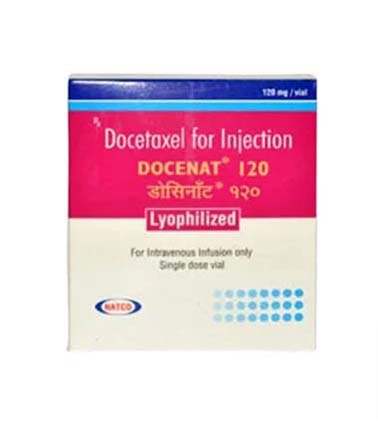Description
Description:
Docenat is a medication manufactured by Natco Pharma Ltd. containing the active ingredient Docetaxel. It is formulated as a 120 mg injection.
Purpose and Indications:
Docetaxel is a chemotherapy medication used in the treatment of various types of cancer, including:
- Breast Cancer: Docetaxel is indicated for the treatment of locally advanced or metastatic breast cancer, either as a single agent or in combination with other chemotherapy drugs.
- Non-Small Cell Lung Cancer (NSCLC): Docetaxel is also used in the treatment of advanced or metastatic non-small cell lung cancer (NSCLC) that has not responded to other chemotherapy regimens.
- Prostate Cancer: Docetaxel may be prescribed for the treatment of hormone-refractory metastatic prostate cancer, either alone or in combination with other medications.
- Stomach Cancer: Docetaxel is sometimes used in the treatment of advanced or metastatic stomach (gastric) cancer, particularly in combination with other chemotherapy agents.
Mechanism of Action:
Docetaxel belongs to a class of medications known as taxanes, which work by disrupting the microtubule network in cancer cells, preventing cell division and ultimately leading to cell death. By inhibiting microtubule dynamics, docetaxel interferes with the growth and spread of cancer cells, thereby slowing the progression of the disease.
Administration:
Docenat is administered as an intravenous infusion under the supervision of a healthcare professional. The dosage and frequency of administration depend on factors such as the type and stage of cancer being treated, the patient’s overall health, and their response to treatment. Treatment with Docenat is typically given in cycles, with rest periods between each cycle to allow the body to recover.
Monitoring and Side Effects:
Patients receiving Docenat should be monitored for potential side effects, which may include:
- Neutropenia (low white blood cell count)
- Anemia (low red blood cell count)
- Thrombocytopenia (low platelet count)
- Fatigue
- Nausea and vomiting
- Diarrhea
- Hair loss (alopecia)
- Peripheral neuropathy (numbness or tingling in the hands or feet)
- Fluid retention
- Hypersensitivity reactions
It is important for patients to report any unusual or severe side effects to their healthcare provider.
Prescription Requirement:
Docenat is a prescription medication and should only be used under the guidance of a qualified healthcare professional. It is important to discuss with a doctor before starting docetaxel therapy, especially if there are underlying health conditions or concurrent medications.
Clinical Considerations:
Docetaxel is an important component of treatment regimens for various types of cancer, and its use may be associated with significant improvements in survival and quality of life for patients. However, treatment with Docenat can also be associated with significant side effects, and careful monitoring and management are essential to minimize risks and optimize outcomes.
Patient Education:
Patients receiving Docenat should receive education about the purpose of the medication, proper administration techniques, potential side effects, and the importance of adherence to the prescribed treatment regimen. They should also be advised on strategies to manage side effects and maintain overall health during treatment, such as staying hydrated, eating a balanced diet, and getting regular exercise.
Please note that the information provided here is for general informational purposes only and should not be considered as medical advice. Always consult with a healthcare professional for personalized guidance and treatment recommendations based on individual medical needs and conditions.










Reviews
There are no reviews yet.